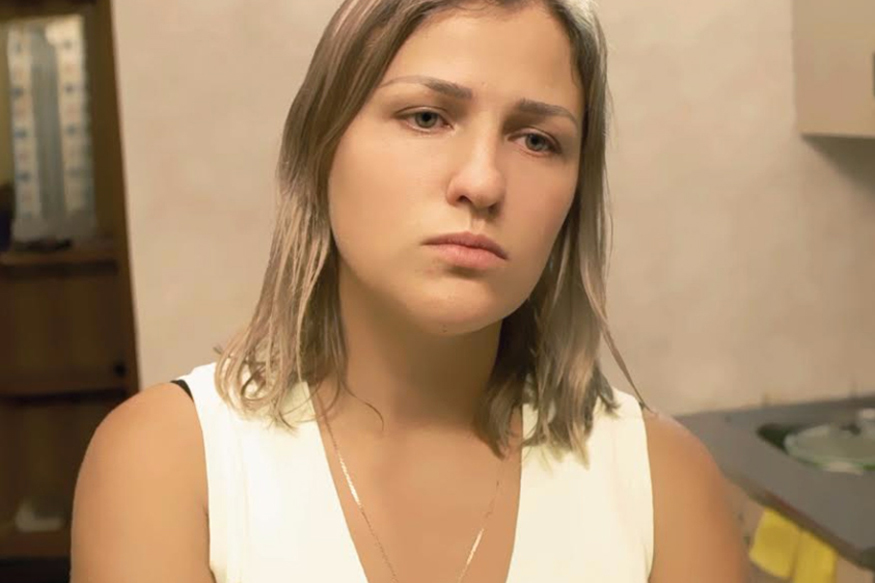Two Films at Tokyo Festival Paint Women in Black
Sveta and The Home in Turkish are two provocative movies at the ongoing Tokyo International Film Festival that bring out the dark aspects of the protagonist.

A still from Sveta (Youtube)

*The post contains spoilers*
There were two extremely provocative movies at the ongoing Tokyo International Film Festival. And they painted women as notoriously evil.
One of the two movies which tackles women and crime and which played in the Festival's main competition, Sveta, focuses on a deaf-mute girl – and the actress, Laura Koroleva, who essayed the title role – cannot actually hear or speak. So, this made her look strikingly authentic.
The director of Sveta, Zhanna Issabayeva from Kazakhstan, spins a story of a deaf-mute couple and their two adorable looking children (also impaired) – and how the family faces the possibility of having the roof over its head removed. When the bank gives Sveta an ultimatum to pay up her mortgage or lose her apartment, she is devastated. Adding to this is her employer's decision to fire her, because the garment factory where she works – and she works harder than the rest of the women there in order to make up for her disability – has begun to run out of orders.
Narrated in Russian sign language, the film traces Sveta's predicament – compounded by her young husband's indifference to the looming threat – and how she manipulates life in her favour. She kills the woman in the factory who stands between her and her job, and gets back to work the following day with no guilt or remorse.
But then there still remains the mortgage to be settled, and Sveta coaxes and cajoles her husband to bump off his seriously ailing 92-year-old grandmother so that he can inherit her house. “We can rent that to pay our mortgage, and in five years time, we could own two houses”, she pushes her husband to commit the crime.
It may seem so amoral that a strong woman like Sveta, toughened by her life in an orphanage, gets down to such heinous measures. Koroleva's performance is exemplary, but her acts may appear so terribly evil. But still, she does all this to keep her family together and under a secure roof. But is this right? No way.
The movie ends. And Sveta escapes any form of punishment. She walks out of the whole mess with a clean conscience, and if one were ask her, she would undoubtedly quip, but I did it for my family.
I remembered a Woody Allen film here. Called Match Point, a married tennis coach in England murders his mistress when she becomes too uncomfortable for him, and threatens to ruin his marriage. And he escapes neatly with none, not even the cops, smelling a rat that the woman was killed in cold blood. The Match Point hero, Jonathan Rhys Meyers, and Koroleva seemed so similar to me. Both had the least of qualms or guilt about the crimes they committed.
In the other movie, The Home in Turkish, by the first-time Iranian helmer, Asghar Yousefinejad, a house (like in Sveta) becomes a bone of contention, and a woman the manipulator all over again.
Totally a chamber piece – set inside a single house – The Home has a riveting script and a camera whose energy never lets us have a dull moment in a narrative that is tragic. We see the death of a man -- but the body is never shown – and his family, including his only child, a married daughter, Sayeh (Mohadeseh Heyrat), arrives to make sure that he is buried without any delay as the custom requires.
But complications arise when Ahmedi from a medical centre reaches the house carrying the last will and testament of the dead man that talks about his wish. He wants his body not to be buried, but given away to the medical institution for research. Sayeh, however, is dead against this, and insists that her father must be given a burial, a decent burial. His body cannot be mutilated under any circumstance, she insists, cries and throws up a hysterical tantrum.
It is only when Sayeh's husband reaches the house, we are let into a horrible secret. The woman who had never visited her father since her marriage six years ago, had begun seeing him in the last weeks of his life. And she had slow poisoned him so that she may inherit his house! The husband and wife are naturally nervous. What if the poisoning comes to light during the autopsy!
Obviously, unlike Sveta – who indulges in unthinkable crimes to save her family, however wrong this path may have been – Sayeh is motivated to murder her own ailing father to satisfy her greed, a greed that is tempered with vicious impatience.
 Live TV
Live TV
Recommended For You
 Kidambi Srikanth: Gopi Sir Believed in Me More Than Anybody Else
Kidambi Srikanth: Gopi Sir Believed in Me More Than Anybody Else You'll Be Shocked By This Crazy Photo Of Sunny Leone Doing The Most Surprising Thing To Daniel Weber
You'll Be Shocked By This Crazy Photo Of Sunny Leone Doing The Most Surprising Thing To Daniel Weber Golmaal 5 In The Works: We Bet You Can't Guess The Film's Official Title
Golmaal 5 In The Works: We Bet You Can't Guess The Film's Official Title Deepika Padukone Slays In A Sabyasachi Outfit At Padmavati 3D Trailer Launch Event
Deepika Padukone Slays In A Sabyasachi Outfit At Padmavati 3D Trailer Launch Event SEBI Empowers Investors Through an Awareness Campaign
SEBI Empowers Investors Through an Awareness Campaign


 3-min read
3-min read

